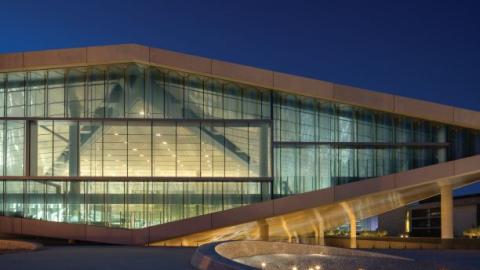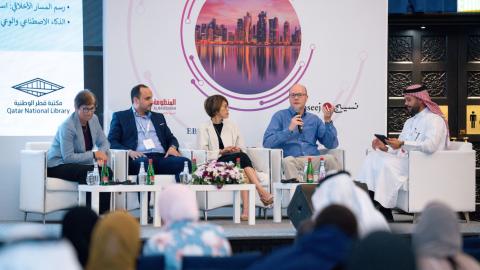
Qatar National Library, in collaboration with Hamad Bin Khalifa University, held the first event of the newly launched initiative, the "Cultural Salon," which aims to create a positive atmosphere that enriches culture and raises public awareness through a series of periodic events featuring subject-matter experts.
The event, held on 13 March, discussed the impact of the 2022 FIFA World Cup™ on Qatar and the region and was attended by His Excellency Dr. Hamad bin Abdulaziz Al-Kawari, Minister of State and President of Qatar National Library, Dr. Ahmad M. Hasnah, President of Hamad Bin Khalifa University, and other senior officals. His Excellency Saad Mohammed Al-Rumaihi, President of the Qatar Press Center, moderated the session, which featured distinguished experts Dr. Ibrahim Arafat, Professor of Political Science at Hamad Bin Khalifa University, and Ayman Jada, broadcaster, sports commentator, and former Director of BeIN Sports.
Commenting on the event, His Excellency Dr. Hamad bin Abdulaziz Al-Kawari, Minister of State and President of Qatar National Library said: “I am excited to see the “Cultural Salon” event we have been promising for so long finally come to fruition. The opening session exceeded my expectations, thanks in large part to His Excellency Al Rumaihi, Dr. Arafat and Mr. Jada, for sharing their knowledge on this important subject. I am confident that the upcoming salon sessions, held in cooperation with Hamad Bin Khalifa University, will be just as successful. We thank Dr. Hasnah for his coperation with the Library."
Dr. Ahmad M. Hasnah, President of Hamad Bin Khalifa University said: “We at Hamad Bin Khalifa University welcome the initiative of the “Cultural Salon” and fully support the Library's leading role in spreading culture. This session addressed a crucial topic - what happens after the World Cup for Qatar, following its tremendous success in organizing and hosting this monumental event? To me, the World Cup was a cultural testament to Qatar and the Arab and Islamic world, showcasing not only our ability to organize such events but also revealing the true image of Arabs to the world."
During the discussion, Mr. Jada highlighted how the "Cultural Salon" chose a topic related to the World Cup, recognizing that football is not just a game, but a significant part of culture that unites people. He stated that the criticism directed towards the State of Qatar, claiming that it lacks a football history, is unfounded and incorrect. This is because the Football League had existed in Qatar for half a century prior to hosting the World Cup. The success of the World Cup demonstrated the country's ability to compete and excel globally, and also exposed the racism of Western thinking towards Arabs and Muslims.
Qatar's successful organization of not only the World Cup, but also other world and regional championships, showcased their excellent organization and participation. The World Cup was a safe and successful event that represented the Arab and Muslim world without causing any disturbances, with a great turnout from female fans. Lastly, Mr. Jada emphasized that the benefits, gains, and lessons learned from this historic event should be studied and remembered.
Dr. Arafat reflected on the lessons that can be learned from the World Cup, such as the importance of working hard and patiently, and how Qatar's success has left a lasting impression.
He further identified several issues that continue to affect the relationship between Arabs and the wider world, including Islamophobia, economic exploitation and media bias amongst others. He argued that while the World Cup challenged prevailing global mental legacies about Arabs and Muslims, changing the status and image of Arabs in the global order cannot be achieved by a single event, nor can it be demanded by one Arab state.
Finally, Dr. Arafat discussed the Arab narcissistic wound, which he described as a deep civilizational pain that has lasted for centuries and has taken over the way Arabs think about the world. He argued that this wound is the biggest psychological difficulty that Arabs suffer from in international relations to this day. He ended his discussion by pointing out that Qatar's successful implementation of a proactive vision for a fair and just international order, demonstrated through initiatives like the World Cup, affirms the value of anticipating global changes rather than simply reacting to them. He said this should serve as an example for Arab nations in their relations with the world beyond the FIFA tournament.
The "Cultural Salon" will host a series of events throughout the year, featuring experts from various fields. It aims to support the country's cultural and intellectual scene, providing a platform for diverse voices and perspectives.
For a complete list of QNL events, please visit the Events page on the Library’s website (www.qnl.qa/en/events) or the QNL mobile app which is free and available for download globally on iOS devices from the App Store and for Android from Google Play.







